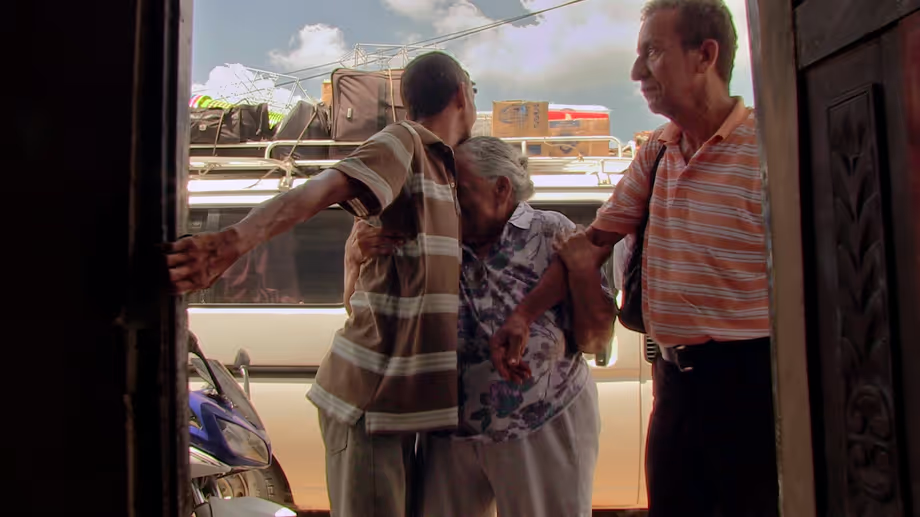La Casa De Mama Icha Discussion Guide The Film: Participants and Key Issues
The Film: Participants and Key Issues

Participants
Mama Icha: Maria Dionisia Navarro, “Mama Icha,” is a 93-year-old Colombian émigré who for the past 30 years has lived in Philadelphia, PA with her doting daughter and granddaughter, Epifania and Michelle Angela respectively. Though Mama Icha relies upon the social and health services available to her in the United States, and though her migration to the United States helped her escape poverty, at this stage in her life, she decides to return to Colombia to live and die in the house she has built for herself in Mompox. This house was paid for by money Mama Icha earned in the U.S. and sent back to Colombia, a type of money transfer common to migratory people and known as “remittance.”
Epifania, is a sixty-three-year-old woman and Mama Icha’s fourth child. She moved to Philadelphia when she was 17 and has three children in their thirties. She knows the dynamics of work and survival in the United States and does not desire to return to Colombia. She secured a pension from the United States government for Mama Icha. Epifania helped build the Mompox house with those resources. She works hard in Philadelphia: in the mornings as caregiver for a white American woman who lives on her own. In the evenings, she prepares Colombian-Caribbean food for social events in Philadelphia. She feels betrayed by her mother's wish to return to Colombia.
Michelle Angela is a mediator between her mother, Epifania, and her grandmother, Mama Icha. She shares her mother’s fears regarding the life her grandmother may face upon returning to Mompox, and thus, Michelle Angela disagrees with Mama Icha’s position. Michelle Angela is a Latinx artist with a successful career in the United States. Her artwork deals with gender, identity and issues facing migrating families. She often expresses in her art the experiences of her mother, her grandmother, and other members of the Latin-American immigrant community in which she was raised.
Alberto is Mama Icha’s youngest son. He was 14 when Mama Icha left Mompox for the United States, and he was very affected by her absence. He is dependent on alcohol and on financial support from his mother. During the last years of Mama Icha’s stay in Philadelphia, Alberto was responsible for taking care of the house in Mompox. Although he works fixing bicycles, he does not make enough money to sustain the house. Each month, he expects remittance money from Mama Icha to pay for the utilities, taxes and maintenance costs of the house. Mama Icha wishes to restore a maternal relationship with Alberto, but there are many barriers in their way, including the interventions of Gustavo.
Gustavo is Alberto’s older brother and Mama Icha’s son. He lives in Barranquilla and has been divorced twice. He is unemployed, has eight children and lives in the house of one of them. He assumes the responsibility of taking care of his mother during her return to Colombia with one condition: she must sell the Mompox house and buy a new one in Barranquilla. This, Gustavo says, will allow him to have the resources needed to pay for Mama Icha’s expenses and healthcare. He portrays his brother Alberto as an evil person in order to have him evicted from the house. He inadvertently serves as an antagonist.
Key Issues
La Casa de Mama Icha is an excellent tool for outreach and will be of special interest to people who want to explore the following topics:
- The emotional and familial toll of migration
- The hopes and challenges of return migration
- Remittances
- Honoring agency in elder care
- Colombian diasporic communities
- Lived experiences of globalization
- Poverty
- Housing as a human right
- Finding home and belonging within conditions of displacement

